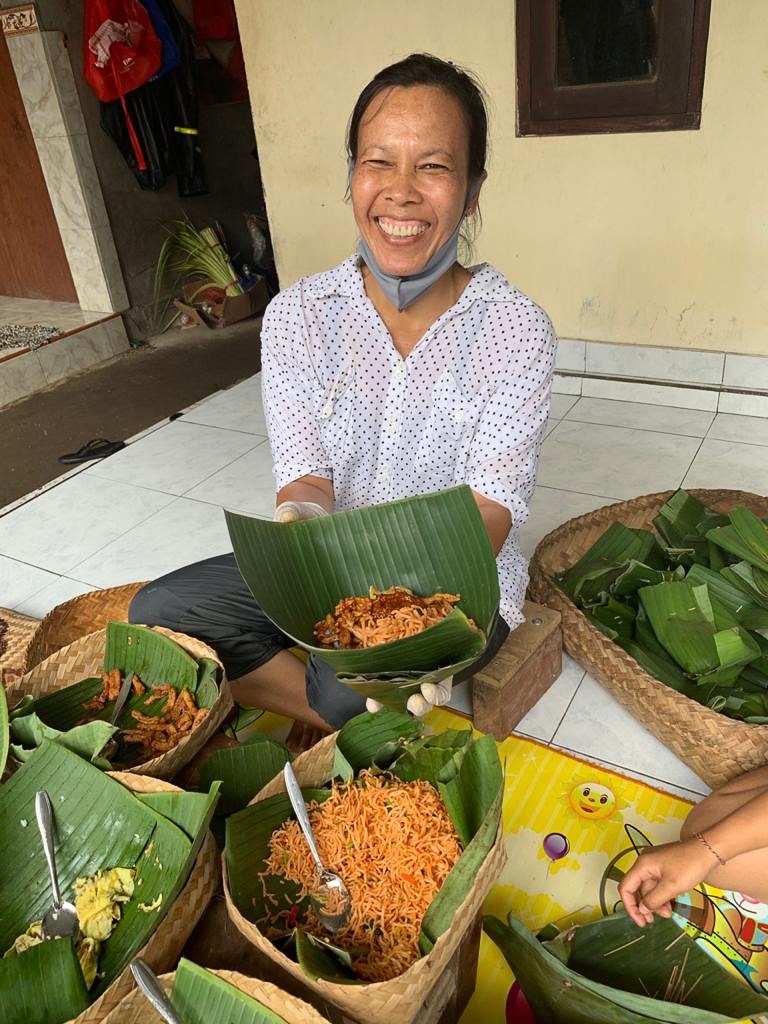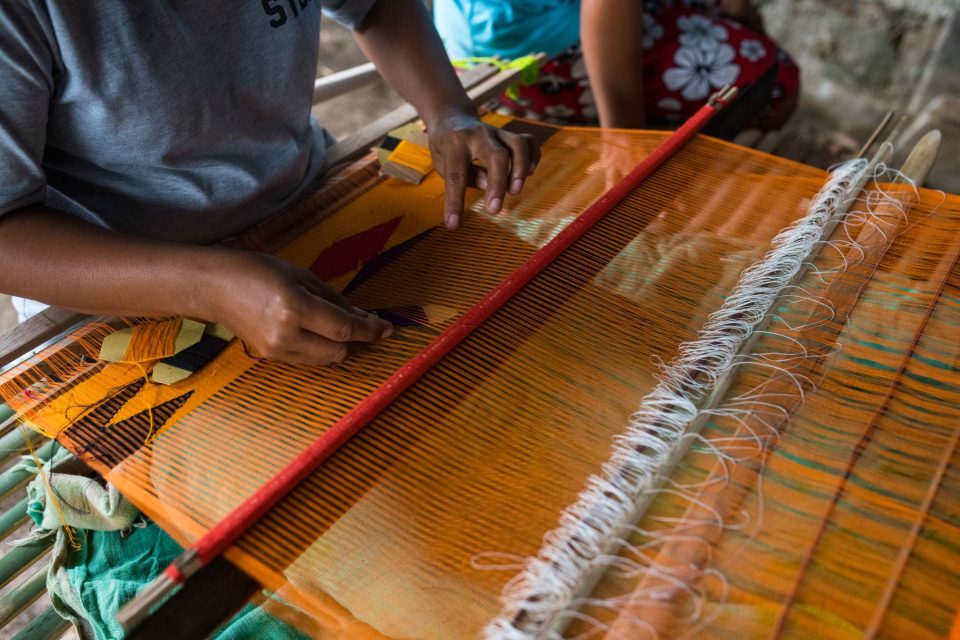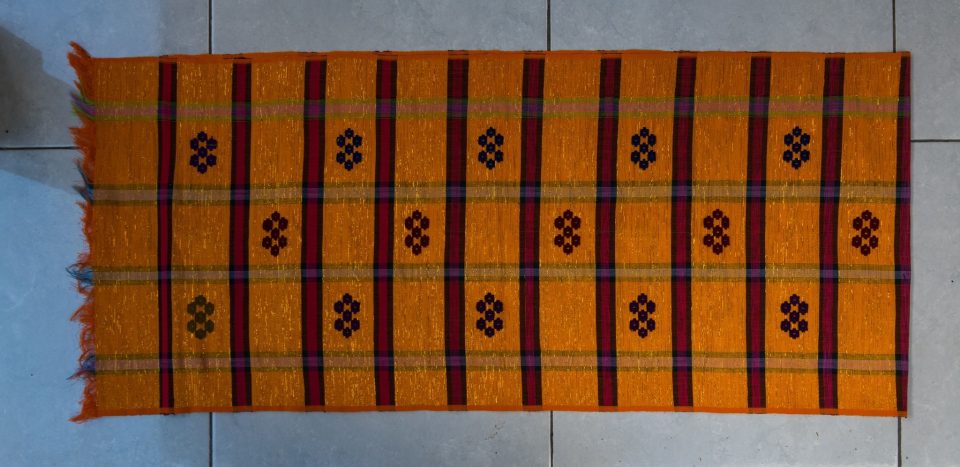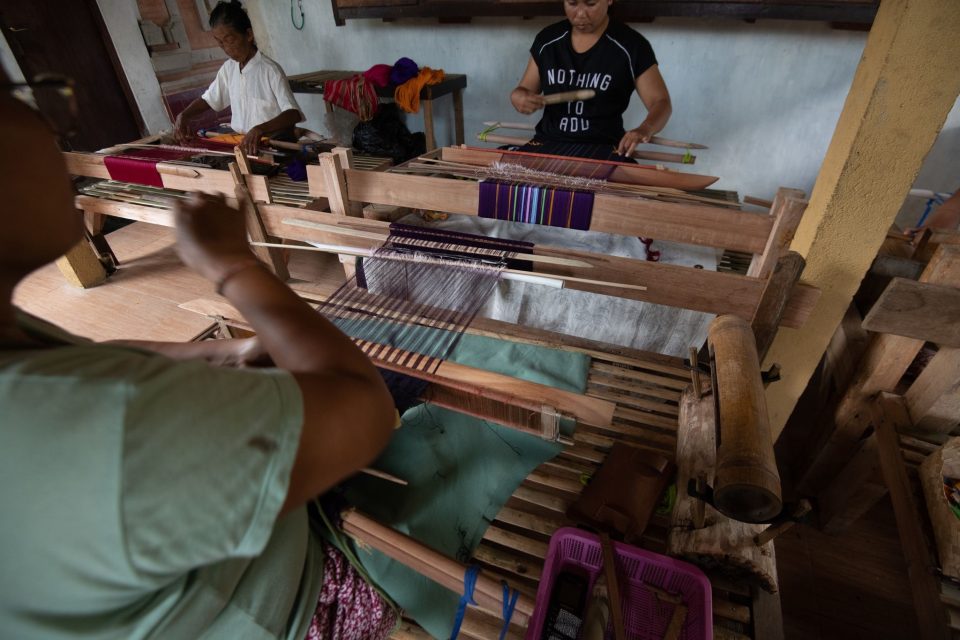Stephanie Brookes writes about Pejeng Kangin, a resilient weaving village just outside Ubud that has united the weavers of Bali and helped revive a long-lost artisan craft.
Around 25 years ago in Pejeng Kangin Village, the women were spinning cotton, dyeing with natural dyes, and click-clacking away on their looms every day. However, with the advent of tourism in Bali increasing during the 80s-90s, many young people abandoned their previous jobs and went into tourism. They gravitated towards hotel and restaurant work and simply left their looms and craft behind. Putu was one of these people. “I learned to weave when I was eight years old,” she said, “but because of economic reality, a job in tourism paid a lot more than weaving. I got busy working full time in the tourism industry, raising three boys, plus my farming duties and had no spare time for weaving.”
Often it takes a leader to emerge. Putu indeed emerged, and she found a way to get the weavers back on the looms. The motivation to revitalise weaving in the village was directly related to COVID. Many people in the village were out of work. When Bali closed its international airport and Visa on Arrival (VoA) stopped in March 2020, around 80 percent of the workforce employed in tourism no longer had gainful employment. A plan was hatched with the head of the village, Made Astawa, and a couple of local expats who lived in the village to reignite interest in the local weaving traditions. Interest in weaving started to grow. A fund was set up called The Togetherness Project, and a donation campaign was initiated to buy new looms and reels of cotton from the market.
Weaving
Putu knew from the elders in the village that one of the weavers used to make handwoven silk and cotton brocade for the daughter of Suharto, the former President of Indonesia from 1967-1998. Putu found the master weaver, Ibu Agung, and also discovered Ibu Klemik and Apel Murtini. There were not just one but three very talented weavers in this tiny village. There was an agreement that the women would share their weaving skills and knowledge with other women in the village and teach the young ones, so the plan went into action. All because of COVID and the resourcefulness of these village women, those old looms reappeared from hidden corners and saw the light of day yet again.
Once the word spread, several local women showed interest, and the Pejeng Kangin weavers united again. With the help of donations, extra looms were acquired, the art of natural dyeing came back into force, and regular Klungkung market trips were made for silk and cotton thread. Just two weeks later, Pejeng Kangin had re-established its ikat cottage industry.
Today, many orders are coming in requesting natural dyes. Back to the old ways, yet again. The plants used for making the natural dyes come from mango leaves (yellow), cacao leaves (grey), banana leaves (green), Secang wood (red), and the favourite of all is the indigo leaves (blue).
Twelve women were weaving six days a week, clacking away on their new looms. Some 18 months later, 35 weavers are busy on the looms. They even dance the Tenun (weaving) Dance regularly at special ceremonies. Dance revival as well as the artisan craft revival!
Putu was already head of the Village Women’s Rice Community (KWT Manik Mertasari) and happily took on the new role of leader of the weaving circle. She came up with a novel idea. If a customer wants an ikat, they are asked to “pay it forward” at the time when ordering so the weavers can buy the materials they need to get started. Putu also encourages contact with the customer personally and sends photos and videos as their specific ikat progresses. Your ikat can even be designed with your own unique motif! You just need to send a photo to Putu’s WhatApp number, and she will assign one of the more experienced, masterfully skilled weavers to make your shawl, set of placemats, rug or bed runner with your own design.
Once completed, your ikat, perhaps a sarong, shawl or wall hanging, can be shipped to you. Better still, now Bali is open for tourism, you can come directly to the village, meet the weavers in person, and collect your ikat. As of 7th March 2022, Bali welcomed foreigners with VoA.
As Putu explained, “We all think it’s important to keep the weaving tradition alive. But, more than that, we really need jobs. Our husbands have been out of work for around 2.5 years now. Most of them in this village were tour drivers, hotel workers, or waitstaff. It’s very encouraging now that Bali is open, but it’s pretty slow to start, so we must step up to the mark now.”
Local Food Packages
No one has had an easy time with COVID, and the next issue Made Astawa tackled was food delivery. Almost every family in the village of 180 people had close to no income, and there was an urgent need for food staples. Donations via The Togetherness Project enabled the purchase of supplies. In 2020, the Banjar delivered 170 packs of rice, noodles, cooking oil, and eggs to every household weekly. Twenty local volunteers went out on foot with a list, and every home that needed help received it; no one was left out. “That is very important,” said Made, “If we give to one, we give to all. We live by adat (traditional) law, and this is our way”.
Outreach Packages
Working with Bali Crisis Kitchen and Scholars for Sustenance, The Togetherness Project employed 44 cooks in the village. They made up a hundred fresh food packs every week. These were hand-delivered to Indonesians under challenging circumstances, many living in makeshift shacks and kos (boarding) accommodation or on the streets in Kuta and Denpasar. Many lost their jobs in tourism and construction and had no means of renting housing with a kitchen where they could cook. In fact, they couldn’t even afford one nourishing meal a day, and many ran out of savings.
Many of these workers are from Java, Sumba, Flores, Papua, and other islands and could not get back to their villages. They relied on community projects to survive. Now that the crisis has eased, everyone on the island is looking forward to tourism returning to pre-March 2020 levels.
Cooking School
In addition to the weaving enterprise and a new era of cooks, Putu has also revived the village cooking school. You can find them at www.ubudvillageplate.com. This cooking experience, in the home of a Balinese, links tourists with local families. The enterprise is slow to start right now. Still, as foreign and domestic tourist arrivals keep increasing, the business will pick up, and prosperity will return to this village once again. Taking a cooking class in Ubud was always in the top 10 things to do, so the village is excited to welcome the tourists back and provide another authentic way to connect visitors with Balinese culture – through food.
How can I help?
The weavers need orders. Please consider ordering a beautiful hand-crafted ikat. You can be part of the solution and help keep this cottage industry alive, aligning with strong artisan and cultural significance. By purchasing a beautifully hand-crafted piece, you help to keep the ancient knowledge of traditional weaving honoured and, most importantly, create inspiration for the younger generation of women weavers.
Fact File Project to Support the Weavers: www.togethernessproject.net
Local Balinese interviews: YouTube interview channel
Weaving orders: Please order your scarf, sarong, table runner, placemats, wall hanging or bed runner with Wayan Ellen. togethernessproject2020@gmail.com or WA +62 817 4773 619 (Wayan Ellen)
Head of Banjar Pesalakan, Pejeng Kangin – Made Astawa: WA +62 812 3960 3177. Email: madeastawa83@gmail.com
Photographer and Founder of Togetherness Project: www.davidmetcalfphotography.com
Local Pejeng Kangin Homestay Guesthouse Founder of Togetherness Project: www.swallowguesthousebali.com






